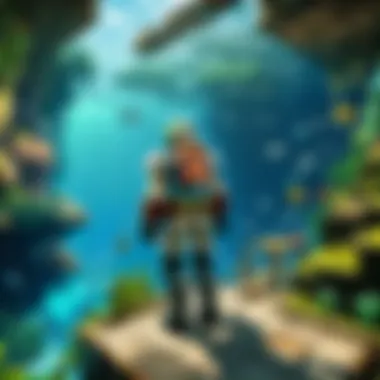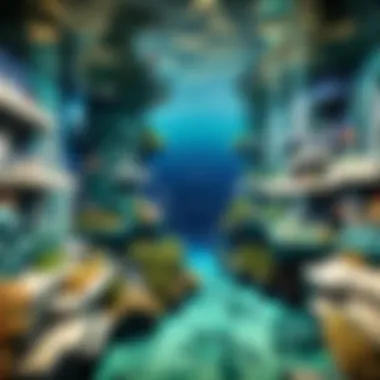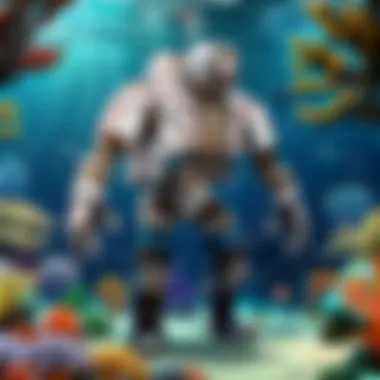Unveiling the Intriguing World of Marine Biologist Games: A Deep Exploration of Educational Gaming


Minecraft Game Guides
When it comes to marine biologist games, Minecraft offers an unconventional yet intriguing avenue for enthusiasts to explore virtual ocean environments. Crafting a character within this blocky world opens up a plethora of opportunities to mimic the roles and activities of real-life marine biologists. From studying underwater biome diversity to investigating coral reef conservation, players can engage in meaningful gameplay that bridges entertainment with education. Understanding the intricacies of character creation not only enhances the gaming experience but also immerses individuals in the scientific aspects of marine life.
Building techniques in Minecraft serve as a valuable tool for players to construct replicas of marine habitats and ecosystems. Through a guided tutorial on building methods, aspiring biologists can mimic research stations, underwater laboratories, and other scientific structures within the game. By mastering these techniques, players gain insights into the architectural elements of marine biology research facilities, fostering a deeper appreciation for the practical applications of their virtual creations. Incorporating accurate building techniques not only adds realism to the gameplay but also aids in the comprehension of scientific concepts.
Exploring the realm of redstone mechanics in Minecraft unveils a world of automation and innovation that parallels the problem-solving skills required in marine biology. Delving into the mechanisms behind redstone circuits allows players to simulate data collection processes, monitoring devices, and environmental sensors commonly used in marine research. Understanding these mechanics not only stimulates creative thinking but also imparts a rudimentary understanding of technological tools utilized in the field of marine biology. By unraveling the complexity of redstone, players can develop an appreciation for the intersection of technology and marine science within the gaming environment.
Crafting recipes in Minecraft act as a gateway for players to experiment with different materials and resources, mimicking the procedures involved in marine biology research. By accessing an encyclopedia of crafting recipes, individuals can replicate laboratory experiments, fieldwork tools, and marine organism samples within the game. This hands-on approach to crafting fosters a sense of experimentation and discovery, paralleling the scientific method employed by marine biologists. Engaging with crafting recipes not only enhances players' understanding of scientific processes but also encourages them to delve deeper into the world of marine biology through practical in-game applications.
Prelude to Marine Biologist Games:
Marine biologist games represent a unique intersection of education and entertainment, offering players a captivating journey into the depths of oceanic realms. In this article, we will intricately dissect the multifaceted world of marine biologist games, highlighting their pivotal role in fostering scientific curiosity and environmental awareness. As we navigate through the immersive landscapes of virtual marine ecosystems, we will unravel the intricate tapestry of gameplay mechanics and educational nuances that make these games a valuable asset for learners and enthusiasts alike.
Understanding the Educational Value:
The Importance of Gamification in Learning:
Gamification stands as a cornerstone in modern educational methodologies, infusing elements of play and engagement into conventional learning paradigms. Within the context of marine biologist games, gamification serves as a catalyst for knowledge retention and skill development. By incorporating game-like features such as rewards, challenges, and interactive feedback mechanisms, these games elevate the learning experience to new heights, making complex scientific concepts more accessible and engaging.
Engaging Players through Interactive Experiences:
Interactive experiences play a pivotal role in engrossing players within the virtual marine landscapes, fostering a sense of exploration and discovery. Through these interactive elements, players are not passive spectators but active participants in the learning process, allowing for a deeper immersion and understanding of marine biology concepts. The seamless integration of interactive gameplay mechanics ensures that players remain invested and motivated to delve deeper into the intricate world of marine science.
Benefits of Marine Biologist Games:
Enhancing Scientific Knowledge and Understanding:
The immersive nature of marine biologist games provides a dynamic platform for enhancing scientific knowledge and understanding. By simulating real-world scenarios and ecosystem dynamics, players gain valuable insights into marine biology principles and conservation practices. These games not only bolster scientific literacy but also nurture a deep appreciation for the delicate balance of marine ecosystems, instilling a sense of environmental stewardship among players.
Promoting Conservation Awareness:
Marine biologist games play a crucial role in advocating for conservation awareness and preservation of marine habitats. Through interactive gameplay and narrative-driven missions, players are sensitized to the importance of marine conservation efforts. By actively engaging in virtual conservation initiatives within the game's framework, players develop a heightened sense of responsibility towards protecting our oceans and marine biodiversity, transcending virtual boundaries to real-world impact.
Overview of Popular Marine Biologist Games:
Endless Ocean: Blue World:
Endless Ocean: Blue World immerses players in a vast underwater world teeming with marine life and hidden treasures. Its emphasis on exploration and adventure appeals to players seeking a serene yet compelling gameplay experience. The game's realistic graphics and immersive sound design enhance the overall gameplay, offering a truly immersive dive into the wonders of the ocean.
Beyond Blue:
Beyond Blue invites players to embark on a visually stunning journey through the azure depths of the ocean. Known for its breathtaking visuals and emotionally resonant narrative, Beyond Blue compels players to explore the mysteries of the deep sea while highlighting the importance of marine conservation. Its innovative storytelling and intuitive gameplay mechanics make it a standout choice for ocean enthusiasts.


Fish: a Tap Essay:
Fish: a Tap Essay provides a unique twist on traditional gaming experiences by blending gameplay with educational narratives. Players engage in interactive storytelling, guiding the protagonist fish through challenges and adventures while uncovering marine biology facts along the way. This blend of gameplay and learning offers a novel approach to marine biologist games, making learning entertaining and insightful.
Oceans: Our Blue Planet VR Experience:
Oceans: Our Blue Planet VR Experience transports players into a stunning virtual reality rendition of Earth's marine ecosystems. Through the immersive power of VR technology, players get a firsthand glimpse into the wonders of ocean life, fostering a deep connection to marine environments. The VR experience creates a sense of presence and awe, making it a compelling choice for those eager to explore the ocean's mysteries from a new perspective.
Exploring Virtual Marine Ecosystems
In this article, delving into virtual marine ecosystems provides a crucial understanding of the intricate underwater worlds awaiting exploration. The significance lies in the immersive experience these ecosystems offer to players, merging education with entertainment seamlessly. By simulating the depths of the ocean, players can gain insights into marine life and conservation efforts in a gamified setting that fosters curiosity and learning.
Diving into Coral Reefs and Marine Life
Discovering Biodiversity in Underwater Worlds
Exploring biodiversity in underwater worlds is a key aspect of marine biologist games. It allows players to get up close with a myriad of marine species, showcasing the richness of underwater ecosystems. The emphasis on biodiversity not only educates players but also raises awareness about the importance of preserving marine life. This focal point provides a dynamic experience that sheds light on the diverse array of flora and fauna beneath the ocean's surface. Its engaging nature makes it a popular choice for this article, drawing players into the immersive learning environment it creates.
Learning about Habitat Conservation Efforts
Learning about habitat conservation efforts immerses players in the challenges faced by marine life due to environmental factors. By highlighting conservation initiatives within the game, players understand the significance of preserving habitats for the well-being of marine species. This inclusion not only educates but also prompts players to reflect on their impact on the environment. The unique feature of this aspect is its ability to instill a sense of responsibility in players, making them more conscious of conservation practices. While its advantages are evident in promoting environmental awareness, some may find the focus on conservation at times challenging within the context of gameplay.
Simulating Research Expeditions
Embarking on simulated research expeditions forms a vital part of marine biologist games' educational value. It allows players to experience the scientific process firsthand, from data collection to analysis. The emphasis on research instills critical thinking and problem-solving skills, essential in the field of marine biology. This experiential learning approach provides a practical understanding of the challenges researchers face in conducting fieldwork. Its contribution to the overall goal of the article lies in offering players a glimpse into the world of marine research in an interactive and engaging manner.
Collecting Data and Analyzing Findings
The process of collecting data and analyzing findings immerses players in the scientific method, enhancing their understanding of research procedures. By actively engaging in data collection tasks, players learn the importance of accuracy and attention to detail in scientific investigations. This characteristic choice for the article emphasizes the role of research in expanding knowledge and contributing to conservation efforts. However, some players may find the data collection process repetitive, affecting their overall gameplay experience.
Understanding the Challenges of Fieldwork
Understanding the challenges of fieldwork exposes players to the obstacles researchers encounter in real-life expeditions. By simulating these challenges within the game, players develop a deeper appreciation for the complexities of marine research. The focus on fieldwork difficulties underscores the perseverance and dedication required in scientific endeavors, offering a realistic portrayal of research environments. While this aspect enriches the educational experience, its emphasis on challenges may pose obstacles for some players seeking a more streamlined gameplay journey.
Interactive Challenges and Quests
Interactive challenges and quests provide players with opportunities to test their knowledge and skills in marine biology. These game mechanics enhance the learning experience by incorporating educational elements into gameplay. By completing missions related to conservation goals, players actively contribute to virtual environmental efforts while honing their understanding of marine science. The integration of educational content within interactive challenges elevates gameplay dynamics, offering a multifaceted approach to learning.
Testing Knowledge through Game Mechanics
The assessment of knowledge through game mechanics evaluates players' understanding of marine biology concepts. By incorporating quizzes, puzzles, and interactive tasks, players engage in a hands-on learning experience. This characteristic choice enriches the article by promoting interactive learning methods that encourage active participation. The unique feature of testing knowledge through game mechanics lies in its ability to reinforce learning outcomes and enhance retention. Nevertheless, some players may find the assessment components daunting, impacting their overall enjoyment of the gameplay.
Completing Missions for Conservation Goals


Completing missions for conservation goals resonates with players who seek to make a positive impact on virtual ecosystems. By accomplishing tasks that align with conservation objectives, players actively contribute to environmental protection within the game world. This focus on conservation instills a sense of environmental stewardship, empowering players to take meaningful actions for the well-being of marine life. The unique feature of completing missions for conservation goals is its alignment with real-world conservation efforts, fostering a sense of purpose and responsibility. Despite its advantages in promoting environmental awareness, some players may find the quest objectives challenging, requiring strategic planning and careful resource management.
Engaging Gameplay Mechanics and Features
In this section of the article, we delve into the crucial aspect of gameplay mechanics and features within marine biologist games. These elements play a pivotal role in immersing players in the virtual marine world while offering a unique educational experience. By focusing on specific components such as interactive challenges, quests, and problem-solving mechanisms, players are engaged on a deeper level, enhancing their learning journey. The intricate design of gameplay mechanics ensures that players are not only entertained but also challenged to expand their understanding of marine biology and conservation efforts. Through thoughtfully crafted features, these games offer a dynamic blend of fun and education, making them a valuable tool for learning.
Role-Playing as Marine Biologists
Exploring Career Paths in Marine Science
Exploring career paths in marine science is a fundamental aspect of marine biologist games, offering players insight into the diverse avenues within the field. By simulating various roles and responsibilities of marine biologists, players gain a comprehensive understanding of the profession's challenges and rewards. This immersive experience not only educates players about marine science but also fosters a sense of curiosity and determination towards pursuing a career in this field. The detailed exploration of career paths adds a layer of realism to the gameplay, allowing players to envision themselves as marine scientists navigating through complex marine ecosystems.
Handling Challenges of Environmental Change
Handling challenges of environmental change is a key theme woven into marine biologist games, reflecting the real-world issues faced by marine biologists today. Through simulations of environmental crises and conservation efforts, players are prompted to think critically and creatively in finding solutions to complex problems. This aspect of the game highlights the importance of actively engaging in environmental stewardship and sustainable practices to protect marine ecosystems. By challenging players to tackle environmental threats within the virtual realm, these games instill a sense of responsibility and awareness towards environmental sustainability.
Customization and Personalization Options
Creating Virtual Avatars for Expeditions
The customization feature of creating virtual avatars for expeditions adds a personalized touch to the gaming experience, allowing players to immerse themselves fully in the marine biologist role. By designing unique avatars that represent themselves in the virtual marine world, players feel a sense of ownership and connection to the gameplay. This customization option not only enhances player engagement but also enables them to express their creativity and individuality throughout the game. The ability to tailor avatars to specific preferences adds a layer of personalization that enriches the overall gaming experience.
Adapting Gameplay to Individual Preferences
Adapting gameplay to individual preferences is a thoughtful element integrated into marine biologist games, catering to a diverse range of player needs and interests. By offering customizable settings and gameplay options, players can tailor their gaming experience to suit their skill level, interests, and learning objectives. This adaptable feature ensures that players of all backgrounds and ages can engage with the game at their own pace, fostering a sense of inclusivity and accessibility. By adapting gameplay to individual preferences, these games promote a dynamic and personalized learning environment that resonates with players on a personal level.
Multiplayer and Collaborative Features
Team-Based Expeditions and Research Projects
The inclusion of team-based expeditions and research projects in marine biologist games promotes collaboration and teamwork among players. By embarking on scientific missions collectively, players learn the value of cooperation and communication in achieving common goals. This multiplayer feature not only enhances social interaction within the game but also simulates real-world research scenarios where teamwork is essential for success. Engaging in team-based expeditions encourages players to strategize, problem-solve, and share knowledge, fostering a collaborative spirit that transcends individual gameplay.
Community Engagement for Conservation Initiatives
Community engagement for conservation initiatives is a significant aspect of marine biologist games, emphasizing the collective effort needed to address environmental challenges. By participating in community-based conservation projects within the game, players develop a sense of responsibility towards marine conservation and environmental stewardship. This feature promotes awareness of global conservation issues and encourages players to take proactive steps towards protecting marine ecosystems. By engaging with conservation initiatives collaboratively, players realize the impact of their actions within the virtual marine world, inspiring them to advocate for real-world conservation efforts.
Impact of Marine Biologist Games on Learning
Marine biologist games play a crucial role in the educational realm by providing immersive experiences that enhance learning. These games serve as powerful tools to educate players about marine ecosystems and conservation efforts. By combining gaming elements with scientific knowledge, players can delve deep into the intricacies of marine biology. Through interactive experiences, players can grasp complex concepts in a fun and engaging manner, promoting a deeper understanding of our oceans and the need for conservation.
Educational Outcomes and Knowledge Retention
Improving Understanding of Marine Ecosystems


Improving understanding of marine ecosystems is a fundamental aspect of marine biologist games. These games offer virtual environments where players can explore diverse ecosystems, encounter various marine species, and learn about the delicate balance of underwater life. By simulating real-world scenarios, players gain firsthand knowledge of the challenges faced by marine environments, fostering a sense of responsibility towards conservation efforts. The interactive nature of these games allows players to engage with ecological concepts in a practical and effective manner, enhancing their overall understanding and appreciation of marine ecosystems.
Enhancing Problem-Solving Skills and Critical Thinking
Enhancing problem-solving skills and critical thinking is a key component of marine biologist games. As players navigate through different challenges, they are required to analyze data, make strategic decisions, and overcome obstacles using analytical thinking. By engaging in problem-solving activities within the context of marine science, players develop valuable skills that can be applied beyond the gaming environment. This emphasis on critical thinking not only enhances gameplay experience but also equips players with essential skills that are transferable to real-world situations, contributing to their overall cognitive development.
Inspiring Future Generations of Marine Scientists
Encouraging Interest in Marine Biology Careers
Encouraging interest in marine biology careers is a pivotal aspect of marine biologist games. By showcasing the diverse roles and responsibilities of marine biologists, these games inspire players to pursue a career in marine science. Through simulated research expeditions and conservation missions, players gain insight into the exciting opportunities available in the field of marine biology. By highlighting the significance of marine research and conservation efforts, these games motivate players to consider marine science as a potential career path, igniting a passion for marine exploration and discovery.
Fostering Environmental Stewardship Values
Fostering environmental stewardship values is a core objective of marine biologist games. By immersing players in virtual oceanic worlds, these games instill a sense of responsibility towards environmental conservation. Players are encouraged to adopt sustainable practices, protect marine habitats, and advocate for the preservation of marine biodiversity. Through interactive gameplay and narrative storytelling, players develop a deep-rooted appreciation for the natural world and become advocates for environmental stewardship, contributing to a more sustainable future for our planet.
Integration of Gaming with Formal Education
Utilizing Games in Classroom Settings
Utilizing games in classroom settings offers a dynamic approach to education by incorporating interactive and engaging learning experiences. Marine biologist games provide educators with innovative tools to teach complex scientific concepts in a captivating manner. By integrating gameplay elements into formal education, teachers can enhance student engagement and facilitate a deeper understanding of marine biology. These games enable students to apply theoretical knowledge in a practical context, fostering a holistic approach to learning that fosters creativity and critical thinking skills.
Incorporating Virtual Field Trips for Learning
Incorporating virtual field trips for learning expands educational horizons by offering immersive experiences that transcend traditional classroom boundaries. Marine biologist games allow students to embark on virtual expeditions to marine habitats worldwide, providing a firsthand exploration of diverse ecosystems and marine species. Through virtual field trips, students can witness scientific research in action, interact with marine biologists, and gain insights into the multifaceted world of marine science. This interactive approach to learning not only enriches traditional teaching methods but also fosters a deep connection to the natural world, inspiring students to become lifelong learners and passionate advocates for marine conservation.
The End: Navigating the Depths of Marine Biologist Games
As we unravel the essence of marine biologist games, the conclusion encapsulates the fusion of scientific exploration and gaming innovation. It serves as a compass guiding players through virtual oceanic worlds, broadening their understanding of marine ecosystems. Through immersive experiences and interactive challenges, players embark on a journey mirroring real-life conservation efforts. This section emphasizes the pivotal role of marine biologist games in igniting curiosity, fostering environmental stewardship values, and promoting scientific inquiry. By embracing this unique blend of entertainment and education, players delve into a realm where learning becomes an adventure.
Embracing the Fusion of Science and Gaming
Immersing in Virtual Oceanic Worlds
Diving into the depths of virtual oceanic worlds transports players to a realm where marine biodiversity thrives. This aspect immerses players in underwater wonders, unveiling the intricacies of marine life. The key characteristic of immersing in virtual oceanic worlds lies in its ability to simulate realistic habitats, offering a glimpse into the delicate balance of these ecosystems. Players can explore diverse underwater landscapes, from vibrant coral reefs to mysterious deep sea trenches. While the immersive experience enhances engagement, it also illuminates the importance of conserving marine environments for future generations.
Expanding Knowledge through Interactive Experiences
Interactive experiences within marine biologist games facilitate a hands-on approach to learning. By engaging with virtual marine ecosystems, players gain valuable insights into environmental dynamics and conservation practices. The key characteristic of expanding knowledge through interactive experiences is the integration of educational content seamlessly into gameplay. This approach not only enhances players' understanding of marine science concepts but also nurtures a sense of responsibility towards preserving natural resources. Despite some limitations in realism, interactive experiences offer a novel way to promote scientific literacy and empower players to make informed decisions regarding marine conservation.
The Future of Educational Gaming
Innovations in Marine Biologist Game Development
Innovations in marine biologist game development propel the genre towards cutting-edge technology and immersive storytelling. This aspect introduces players to sophisticated simulation tools, enhancing the realism of virtual marine environments. The key characteristic of innovations in game development lies in their ability to combine entertainment with scientific accuracy, creating a compelling experience for players. By incorporating advanced graphics and simulation techniques, developers can immerse players in intricately detailed underwater worlds, elevating the educational value of these games.
Potential for Global Conservation Impact
The potential for global conservation impact within marine biologist games transcends virtual boundaries, inspiring real-world action. This aspect highlights the power of gaming in raising awareness about environmental issues and advocating for sustainable practices. The key characteristic of global conservation impact is its capacity to mobilize players towards collective efforts for marine conservation. By promoting eco-conscious behaviors and fostering a sense of global interconnectedness, these games have the potential to drive positive change on a global scale. Despite some challenges in translating virtual actions to real-world impact, the potential for global conservation impact underscores the significance of educational gaming in shaping environmental attitudes and behaviors.



